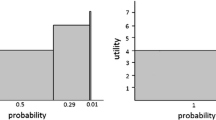Abstract
Probability theory is important because of its relevance for decision making, which also means: its relevance for the single case. The propensity theory of objective probability, which addresses the single case, is subject to two problems: Humphreys’ problem of inverse probabilities and the problem of the reference class. The paper solves both problems by restating the propensity theory using (an objectivist version of) Pearl’s approach to causality and probability, and by applying a decision-theoretic perspective. Contrary to a widely held view, decision making on the basis of given propensities can proceed without a subjective-probability supplement to propensities.
Similar content being viewed by others
References
Albert H. (1985). Treatise on critical reason. Princeton, NJ, Princeton University Press
Albert M. (2001). Bayesian learning and expectations formation: Anything goes. In Corfield D., Williamson J.(eds) Foundations of Bayesianism Vol. 24 of Kluwer Applied Logic Series. Dordrecht etc., Kluwer, pp. 351–372
Albert, M. (2004). Should Bayesians bet were frequentists fear to tread? Saarbrücken.
Albert M., Heiner R.A. (2003). An indirect-evolution approach to Newcomb’s problem. Homo Oeconomicus 20, 161–194
Gillies D.A. (2000a). Philosophical theories of probability. London and New York, Routledge
Gillies D.A. (2000b). Varieties of propensity. British Journal for the Philosophy of Science 51(4): 807–835
Humphreys P. (1985). Why propensities cannot be probabilities. The Philosophical Review 94, 557–570
Humphreys P. (2004). Some considerations on conditional chances. British Journal for the Philosophy of Science 55, 667–680
Lehmann E.L. (1986). Testing statistical hypotheses (2nd ed). New York, Wiley
Lewis D. (1980). A subjectivist’s guide to objective chance. In Lewis D.(ed) Philosophical papers vol. 2. New York and Oxford, Oxford University Press, pp. 83–113
Mas-Colell A., Whinston M.D., Green J.R. (1995). Microeconomic theory. New York and Oxford, Oxford University Press
Mayo D.G. (1996). Error and the growth of experimental knowledge. Chicago and London, University of Chicago Press
Miller D. (1994). Critical rationalism. A restatement and defence. Chicago and La Salle, IL: Open Court
Musgrave A. (1991). What is critical rationalism?. In: Bohnen A., Musgrave A.(eds) Wege der Vernunft. Festschrift zum siebzigsten Geburtstag von Hans Albert. Tübingen, Morh Siebeck, pp. 17–30
Musgrave A. (1993). Common sense, science, and scepticism. Cambridge, Cambridge University Press
Pearl J. (2000). Causality. Models, reasoning, and inference. Cambridge, Cambridge University Press
Popper K.R. (1957). The propensity interpretation of the calculus of probability, and the quantum theory. In: Körner S.(ed) Observation and interpretation (Vol. 9 of Colston Papers, pp. 65–70, 88–89). London: Butterworths.
Rosenthal J. (2004). Wahrscheinlichkeiten als Tendenzen. Eine Untersuchung objektiver Wahrscheinlichkeitsbegriffe. Paderborn, Mentis
Author information
Authors and Affiliations
Corresponding author
Rights and permissions
About this article
Cite this article
Albert, M. The propensity theory: a decision-theoretic restatement. Synthese 156, 587–603 (2007). https://doi.org/10.1007/s11229-006-9139-4
Received:
Accepted:
Published:
Issue Date:
DOI: https://doi.org/10.1007/s11229-006-9139-4




